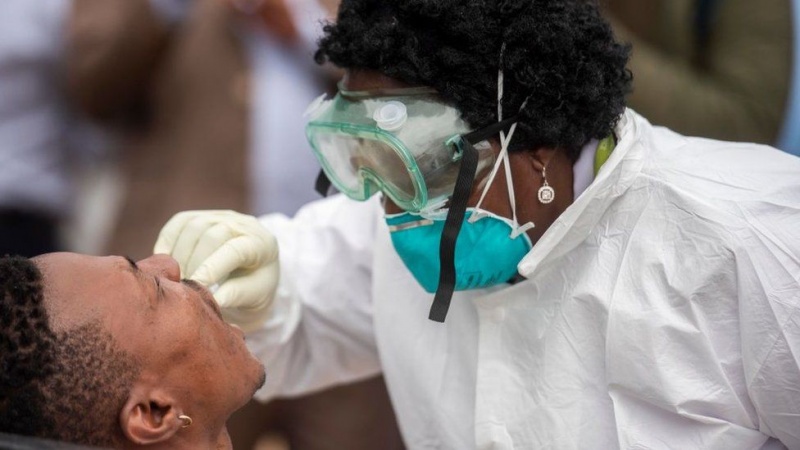Scientists at the Redeemer’s University, Nigeria, say they have found the United Kingdom’s ‘lineage B.1.1.7,’ a mutant variant of the COVID-19 global pandemic, in Nigeria.
They reported that the ‘lineage B.1.1.7’ mutant variant of the coronavirus had been existing in Osun State since August 3, 2020, when they obtained the first sample.
They also reported the collection of another sample from the state in October, and it also showed the presence of this new variant.
The ‘lineage B.1.1.7’ variant of COVID-19 has recently become a source of concern in the United Kingdom, leading to another round of lockdown, PUNCH Health Wise reports.
The RUN study, first published last September 6 in The Conversation, a copyright-free news channel, stated that genome sequencing helped researchers to understand the virus, its epidemiology and evolution.
More recently, the finding was also published online in peer-reviewed Journal of Virological Methods on Monday, December 21, and titled, ‘Detection of the New Emergent SARS-CoV-2 Variant in Nigeria.
Two scientists at Ede, Osun State-based RUN — Professor of Molecular Biology and Genomics, Christian Happi; and Ify Aniebo — carried out the study.
The researchers are of the African Centre of Excellence for the Genomics of Infectious Diseases at the RUN’s Ede campus.
They worked in collaboration with the Nigeria Centre for Disease Control and had reported 24 additional genome sequences of the COVID-19 from Nigeria.
Last week, the UK had reported a more virulent strain of COVID-19, with the potential to infect by 70 percent.
The B.1.1.7 variant of the virus, thought to be a mutation associated with higher transmission and pathogenicity, is the latest scourge in the United Kingdom and has made the British government to declare another lockdown to check its spread.
A handful of countries have also banned flights from the UK in order to prevent its importation into their countries.
Prof. Happi, in The Conversation article, said globally, there is only one strain of SARS-CoV-2, which is also the same as the strain circulating in Nigeria, noting, however, that there are more than 1,000 lineages of this novel virus in circulation around the world.
While identifying the root of the pandemic, the researchers said many sequences originating from China and many global exports — including to South East Asia, Japan, South Korea, Australia, the USA and Europe — are represented in this lineage.
More crucially, the researchers said the B.1 strain of COVID-19 was of a large European lineage that corresponds to the Italian outbreak.
They added that the B.2.1 strain was of a large lineage with representation from the UK, Europe, Jordan, Australia, USA, India, and Ghana.
Talking about their findings, the scientists said, “We investigated the presence of the globally spread spike protein mutation D614G which has steadily increased temporally in Europe, East coast of the United States, South America, Africa and some parts of Asia, and found four Nigerian patients infected with the Spike D614G mutant virus.”
Continuing, they said, “Three of these patients presented with very severe disease.
“This mutation has been associated with higher transmission and pathogenicity, and also helps the virus to evade immune interventions as it dominates the wild type whenever it is introduced into a new location.”
According to the RUNS researchers, only about one percent of the genomes from Nigeria belong to the mutant B.1.1.7 lineage and that one of them predated the UK experience.
Stressing the importance of their findings, the researchers said, “Inasmuch as the full effect of this mutation is still being studied, the importance of a robust genomic surveillance system cannot be overemphasised, as we can identify and report changes in the genomes of pathogens such as SARS-CoV-2 that are of public health interest.”
Speaking about the UK COVID-19 strain in the House of Commons last week, Britain’s Secretary of Health, Matt Hancock, said the new variant of coronavirus might be associated with the faster spread in the south-east of England.
British Prime Minister, Boris Johnson, also said the new strain of coronavirus could be “up to 70 per cent more transmissible” than the earlier one.
Again, on Monday, a lady, Jenny Dissents, on Twitter @StilettoKitten alleged that the new strain of COVID-19 in the UK had blinded her brother.
The RUN scientists, however, noted that, “The lineages identified in Nigeria are not different from the ones identified in other parts of the world and there are no reports of strains or lineages unique to Nigeria thus far.”
Discussing the implications of COVID-19 mutation, they said, “For instance, a virus with an advantageous mutation could affect humans more readily, thereby spreading more easily between people; it could be less recognised by the immune system, or more pathogenic [causing disease].
“If a mutation occurs in the region of the virus that was used to develop the vaccine, the vaccine will not be as effective. This is what happens in the case of flu vaccines because the virus keeps mutating into a new strain.”
As of the time they made their findings public last September 6, the scientists had warned, “We do not know much about SARS-CoV-2 yet. And we don’t know if the virus will mutate into a new strain down the line.
“If it does happen, it could require the development of a new vaccine.”
In an e-mail correspondence with PUNCH HealthWise late Monday night, Prof. Happi was asked if, on account of the COVID-19 mutation, the world might need a new vaccine to combat the virus, he said, “We never said that the new variant would resort in developing a new vaccine.
“The areas affected by the mutations are not the ones targeted by the vaccines.”
He added that their study hadn’t observed rapid rise of the lineage in Nigeria and that they did not have sufficient evidence to indicate that the B.1.1.7 lineage is contributing to increased transmission of the virus in Nigeria.
(C)The PUNCH


Leave a Reply